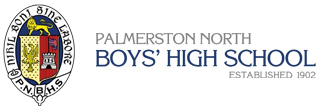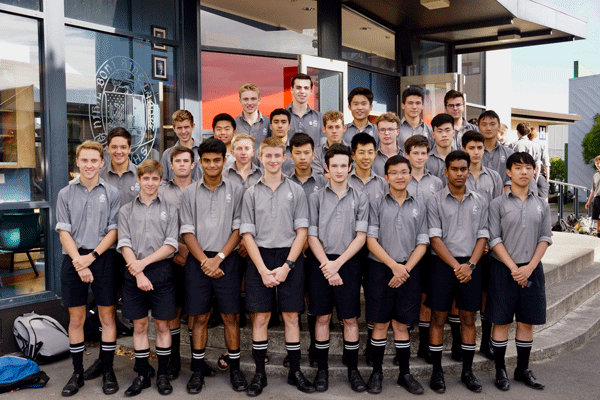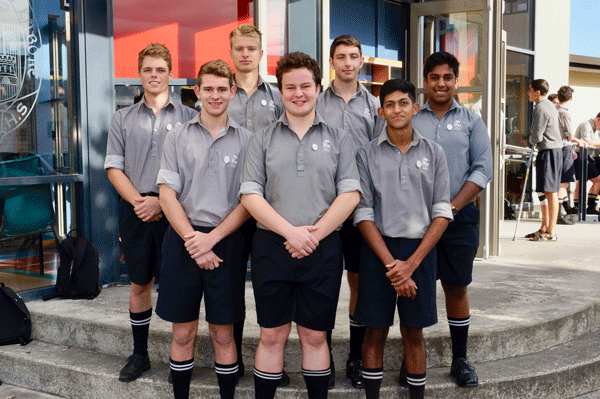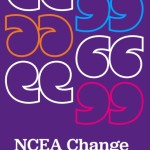
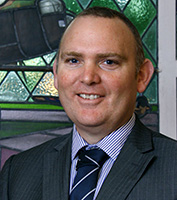 NCEA Update
NCEA Update
In recent week the recommendations from the 2018 NCEA review have been published. As a school we are pleased that many of the concerns that were raised in relation to the initial proposal appear to have been considered. In particular we are supportive of the following aspects of the recommendations, although there are still some finer details that need to be clarified:
- The removal of fees for NCEA and Scholarship examinations for domestic students which will help to make these qualifications accessible for all
- The introduction of specific external assessments for literacy and numeracy
- A decrease in the number of Achievement Standards available in subjects and a standardisation of their credit value allowing for more coherence in programmes, as opposed to the current situation in which knowledge is distilled into small discrete ‘chunks’
- An increased emphasis on external assessment and an equal mix between internal and external assessment meaning that there should be greater comparability in the qualifications awarded by different schools
- The removal of the ’20 credits’ carried from one level of NCEA to the next, meaning that 60 credits are required to gain each level of the qualification
- The introduction of a new ‘Vocational Entrance’ qualification at Level Three alongside ‘University Entrance’ which will help to recognise the diverse range of post-secondary school pathways.
We remain concerned at the assessment loads that are suggested in the recommendations – up to 120 credits at Level One and Level Two and 100 credits at Level Three.
An unfortunate outcome of the NCEA system has been that assessment has been the driver of learning in most New Zealand secondary schools. This situation goes against the principles of curriculum design, where the taught curriculum should be developed according to what is best for students and assessment should be used as appropriate to support this and measure progress.
Further information about the changes can be found online and we encourage your interest (ctrl + click or copy and paste into your web browser): http://www.conversation.education.govt.nz/assets/NCEA/NCEA-Change-Package-2019-Web.pdf
Domestic NCEA and Scholarship Fees Removed
The government has announced that NCEA and Scholarship fees for domestic students are to be removed effective immediately. Consequently, parents of young men studying subjects at NCEA Level One, Two or Three will NOT receive an invoice for these fees in 2019. Please note that currently a fee for NZQA may be showing on the Parent Portal. This needs to be resolved at a national level by the companies who supply school Student Management Systems and there is nothing we can currently do to stop the fee from showing. Any parents who have paid NCEA fees for 2019 will have these credited to their son’s account. Please note that NCEA and Scholarship fees for International students will still be charged.
Character Education
As the year progresses subject departments are progressing on the development of their approach to Character Education. These approaches are wide ranging and focus on a broad range of concepts associated with values and character. Rather than working to a prescribed template, we are wanting to develop a variety of different approaches that maximise the learning opportunities in each subject area.

Alongside a number of other New Zealand boys’ schools we have partnered with CIRCLE Education, a specialist education consultancy, who are supporting us in our work to develop Character Education at PNBHS. CIRCLE are also working extensively with the International Boys’ Schools Coalition and the Association of Boys’ Schools New Zealand on a range of research projects exploring the work of boys’ schools and identifying best practice. The definition of character has evolved through this work and is guiding our development of Character Education.
We are working from an overarching model that identifies three broad aspects of character. The first of these is civic character. Civic character is about meeting minimum standards and expectations of the groups that we belong to – our family, school, social, cultural, sporting and community groups – in order to be accepted as a group member. Being accepted means behaving in a manner that meets the basic expectations of group members, generally treating others with respect and civility and demonstrating consideration for others. As individuals we seek to answer the question “Do I belong?” Gaining a sense of belonging enables us to have pride in the various groups to which we belong. Civic character could be thought of as the base of a pyramid – if we do not build a strong foundation, meet the basic expectations of the communities we want to be members of and gain acceptance into these groups, we will not be able to contribute and we will not be able to ‘build’ the rest of the structure that is our character.
The second aspect is performance character, which emphasises the skills we develop and our performance of those skills. Naturally in a school setting, where much attention is paid to the acquisition of knowledge and skills, a focus on performance character is going to be prominent. If one’s performance is characterised by purpose, persistence and reflection, then they are progressing towards answering the question “Am I reaching my potential?”
The peak of the pyramid is moral character, which is directed towards addressing the question “Am I doing what is good and right in my life?” Unlike the two previous components of character, moral character asks deeper and more probing questions about who we are, as opposed to how we behave and what we can do. People striving to develop their moral character aspire to live a good life informed by a personal code characterised by courage, integrity and humility.
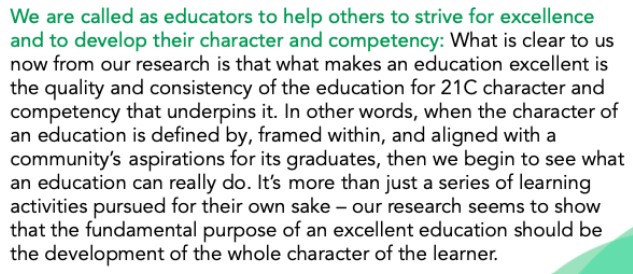
Young men learn and develop their character through processes of realisation, as they develop their ‘inner self’ and begin to realise who they are as a person, and replication, where they replicate what they learn from their environment. It is important therefore that young men are encouraged to reflect and look introspectively, to carefully consider their actions and ideas and what these things say about the person they are becoming. Such self-reflection is a disposition that takes some time to master and will come more naturally to some young men than others. It is also essential that young men have a range of positive role models in their lives so the behaviours that are modelled for them to replicate are positive ones. Parents and other family members, as well as teachers and peers, play an incredibly important role in this respect. Young men who position themselves amongst a group of peers who have each other’s best interests at heart will be advantaged in the development of their character.
Purpose
One’s transition from focusing on the development of the skills and knowledge to achieve ‘success’ in life i.e. performance character, to moral character, and determining whether or not the life they are living is a good one, is an ongoing journey. In his recent publication ‘The Second Mountain: The Quest for a Moral Life’ New York Times columnist David Brooks uses the analogy of two mountains. The first mountain we conquer in life is the one we are led to believe is important to climb. It is the mountain of career development, of the acquisition of consumer goods, of building the image we want others to have of us. However, Brooks asserts that this mountain we have conquered is not one of fulfilment and that at some stage we will experience something – a crisis, challenge, bereavement or perhaps an epiphany – that will send us crashing into the valley at the foot of the mountain, causing us to deeply reflect. With this reflection will come the realisation that there is more to life than what we can do and what we have. At this point we will begin the ascent of the second mountain. The second mountain is much higher and much harder to climb as it is about who we are. Sometimes the reflections that accompany this might illuminate things about ourselves that we are disappointed with, but we have the opportunity to grow as people and to change who we are.
A review of The Second Mountain notes that “We live in a society, Brooks argues, that celebrates freedom, that tells us to be true to ourselves, at the expense of surrendering to a cause, rooting ourselves in a neighborhood, binding ourselves to others by social solidarity and love. We have taken individualism to the extreme—and in the process we have torn the social fabric in a thousand different ways. The path to repair is through making deeper commitments.”
As one begins to reflect on the person they are becoming, they start to realise their purpose in life at a deeper level than the focus on the acquisition of skills and material goods that has become de jour in our contemporary consumerist society. Brooks provides a poignant example of this. In 2007 the Gallup organisation conducted research asking people around the globe whether they felt they were leading meaningful lives. In a surprising result Liberia, with a long history of political instability and internal conflict, came out on top, while the Netherlands, one of the global stalwarts of individual freedoms and a modern history of political stability and peace, came last. Life in Liberia was undoubtedly tough, many people lived day-to-day, struggling to remain safe and to make a living, yearning to lift themselves out of poverty. Such an environment demanded strong community connections as people had no choice but to rely upon each other in order to get by; selfishness was not a luxury people could afford, the focus had to be community as interdependence was critical to survival. In contrast, the level of wealth most inhabitants of the Netherlands enjoy means that they can live independently and there is no need for them to form strong community links. Brooks’ notes “That’s the paradox of privilege. When we are well-off we chase the temporary pleasures that actually draw us apart.” We use our wealth to buy big houses and fill them with expensive consumer goods “but in crisis we are compelled to hold closely to one another in ways that actually meet our deepest needs.” The people of Liberia had a purpose that was greater than their own needs.
Service
Providing service to others is an effective way for young men to begin to develop their connection with their community and to begin to understand the benefits of contributing to something bigger than themselves. Through the Leadership Programme and the work of the Leadership Director, Mr. Lobb, we have had a deliberate focus on expanding the opportunities for young men to become involved in activities which are providing service to their community. Some of the activities undertaken so far this year include Relay for Life, a fundraiser for the Victim Support appeal following the Christchurch terror attacks, the Gumboot Day fundraiser to support the provision of counselling for young New Zealanders who cannot afford it, support of the annual RSA Poppy Day appeal, collecting for Ronald McDonald House and providing labour to set up for the annual Red Cross book sale. In the coming weeks young men will be assisting with the Palmerston North Brick Show, donating blood for the New Zealand Blood Service and will support the work of the Sir Peter Blake Trust with their ‘red socks’ fundraiser.
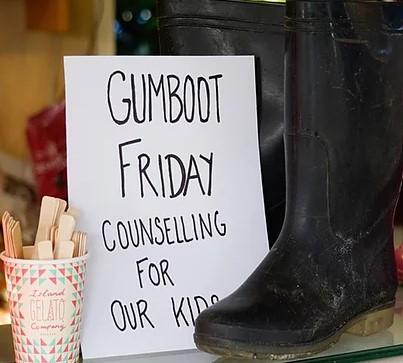
Tangata ako ana i te kāenga, te tūranga kit e marae, tau ana – A person nurtured in the community contributes strongly to society
People who are involved in their community form strong social connections, one of the fundamental tenets of positive wellbeing. They are also more likely to ‘give back’ and contribute to their communities in the future – a worthwhile habit to foster for us all. In 2018 the United nations published a report examining how governments and development agencies can best engage with volunteerism to nurture its most beneficial characteristics. The report was published with the title ‘The Thread that Binds – Volunteerism and Community Resilience’ and concluded that volunteering has the potential to build resilience in both individuals and communities.
Co-curricular Activities
While involvement in cultural and sporting activities is very different to volunteering, it is another avenue through which young men can begin to develop a sense of selflessness; being part of a group means that one’s contributions are to an entity bigger than one’s self. Through supporting teammates, attending practices or rehearsals, showing respect for officials – even when decisions go against them, being organised, maintaining equipment and being on time, young men begin to the dynamics of group interdependence. Additionally, they will be developing a range of skills that will hold them in good stead for the future.
Hopefully your son has involved himself in the growing number of community service opportunities that are regularly advertised through the school notices and at assembly and has committed to some form of co-curricular activity. If not, now might be timely for a conversation about the benefits of such opportunities.
Presentation of New Zealand Super Eight Schools Academic Certificates and Badges
Late in term one we recognised young men who gained their NCEA qualifications endorsed with Excellence in 2018. Young men who gained NCEA Level One endorsed with Excellence received New Zealand Super Eight Schools certificates, while young men who gained NCEA Level Two or Level Three endorsed with Excellence received New Zealand Super Eight Schools Academic badges. The New Zealand Super Eight Schools badges are one of the few that can be worn with school uniform and indicate achievement at the highest level.
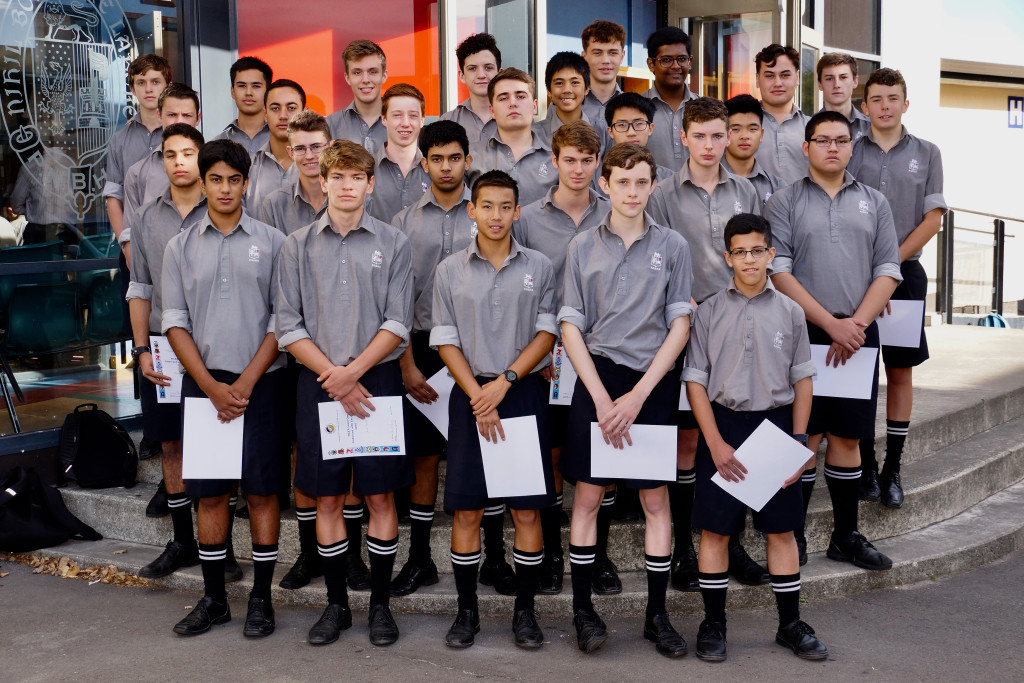
NCEA Level One endorsed with Excellence: Sam Bedford, Kabir Benipal, Ethan Bringas, Devon Chapman, Fergus Congdon, Matthew Cooper, Liam Foss, Cameron Giddens, Ibrahim Hamidah, Ahmed Hamouda, Omar Hamouda, Carson Hepi, Jonathan Holden, John Hopcroft, Jason Lau, Justin Lau, William Leong, Fergus Lloyd, Harrison Marsh, Senuka Onel, Ben Orr, Jack Pronk, RV Quijano, Caleb Rayner, Thomas Rosendale, Oshadha Samarakoon, Karmeehan Senthilnathan, Blake Storrier, Logan Tahiwi, Paul Teoh, Jamie Thompson, Cameron Van Rynbach, Dylan Van Uffelen, Cam Wallace, Ben White and Jackson Woodcock.
NCEA Level Two endorsed with Excellence: Tom Arbuckle, Caleb Bottcher, Xavier Bowe, Jayden Burgess, Matthew Cao, Ciaran Carroll, Kevin Chen, Tyler Collinson, Matthew Cooper, Matt Curtis, Ciaran Egan, Jack Gibbs, Ahmed Hamouda, Cassius Henman, Taylor Herdman, Oliver Inman, Eric Jiang, Ethan Johanson, Andrew Karatea, Tom Kirk, Paul Lee, Conrad Lindstrom, Johnson Liu, Noah Lloyd, Chase Maniapoto, Caleb Martin, Jacob Mildenhall, Antariksh Nag, Connor O’Leary, Liam Peck, Flynn Roache, Kavindith Rodrigo, Ray Su, Thomas Sun, Weiyang Teh, Paul Teoh and Potiki Watling
NCEA Level Three endorsed with Excellence (this group is much smaller as the majority of young men who gained this qualification with an endorsement were in Year 13 in 2018): Ajay Bansal, Ahmad Barzak, Josh Ellingham and Max Zander.
NCEA Level Three endorsed with Excellence and passes in New Zealand Scholarship examinations (in front row: William Wood, John, Cole, Nikhil Banerjee)
Scholarship is the highest secondary school qualification in New Zealand and assesses student’s ability to analyse, synthesise and critique information, solve complex problems and to articulately explain themselves with well-reasoned arguments: Nikhil Banerjee – Scholarship passes in Calculus and Physics, John Cole – Scholarship pass in English, and William Wood – Scholarship pass in History.
